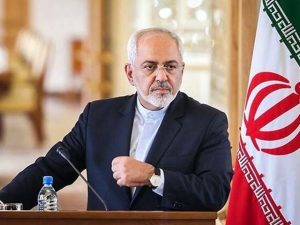Iranian Foreign Minister Mohammad Javad Zarif stepped down on Monday, announcing his resignation on Instagram.
“I am apologising you for all the shortcomings … in the past years during my time as foreign minister … I thank the Iranian nation and officials,” he wrote on his Instagram page.
There was no immediate reason giving for the resignation, which can only take effect if President Hassan Rouhani accepts it.
Iran’s state-run IRNA news agency cited a spokesman, Abbas Mousavi, confirming Zarif had resigned.
Zarif was appointed minister of foreign affairs in August 2013, two years before Iran agreed to scale back its uranium enrichment programme and pledged not to develop nuclear weapons in return for the lifting of international sanctions as part of a landmark nuclear deal brokered with the United States, the UK, France, Germany, Russia, China and the European Union.
A vocal supporter of the deal, Zarif has since come under pressure from more hardline power blocs within the Islamic Republic who were opposed to the agreement, formally known as the Joint Comprehensive Plan of Action (JCPOA).
Criticism of the accord has become more intense in recent months following US President Donald Trump’s decision in May 2018 to withdraw from the deal and reimpose sanctions on Tehran.
Trump’s decision prompted Iran’s currency, the rial, to plunge, prompting sporadic nationwide protests.
Visibly frustrated
Hassan Abbasi, a retired general in Iran’s hardline Revolutionary Guard, gave a speech earlier this month saying he believed Iranian people would spit on Zarif and other Iranian officials – including President Hassan Rouhani and member of parliament Ali Larijani – who backed the nuclear deal.
“Mr Hassan Rouhani, Mr Zarif and Mr Larijani, go to hell,” Abbasi said at a demonstration in the Iranian city of Karaj.
A staunch Rouhani ally, Zarif – normally collected – appeared visibly frustrated at times during a recent security conference in Munich.
Already lashed by criticism over the collapsing nuclear deal and renewed tensions with the US, Rouhani faces anger from religious leaders, hardline forces and an ever-growing disaffected public.
Rouhani is particularly vulnerable because of the economic crisis affecting the country’s currency, which has hurt ordinary Iranians and emboldened critics to openly call for his removal.
The president secured the 2015 nuclear deal after two years in office and won the praise of Iranians, who flooded the streets to celebrate it. Under the agreement, Iran limited its enrichment of uranium in exchange for the lifting of economic sanctions.
But the benefits of the deal never reached much of the Iranian public. Even before Trump pulled out from the accord, uncertainty over its future caused the rial to plummet.
‘Big blow’
Tara Kangarlou, a fellow at East West Institute, called Zarif’s resignation “a big blow” to Rouhani.
“Without Zarif, Rouhani has lost his biggest “reformist chip” on global stage,” Kangarlou said, adding that a potential “hardliner replacement” would “take Iran back to [former President Mahmoud] Ahmadinejad’s era with Rouhani – as a reformist president – pretty much powerless”.
Mehran Haghirian, an Iran analyst and doctorate student of Gulf Studies at Qatar University, said Zarif’s resignation – if accepted by Rouhani – would be “a loss for not just Iranian diplomacy but for those in the international community who seek peace and global stability”.
“Zarif’s positive and successful approach to diplomacy was clearly a nuisance for those who were seeking the continuation of Iran’s isolation since 2013,” he said, citing the likes of Israeli Prime Minister Benjamin Netanyahu, US National Security Adviser John and Saudi Crown Prince Mohammed bin Salman, among others.
Following the resignation, US Secretary of State Mike Pompeo said Zarif is “one of the “front men for a corrupt religious mafia”.










Comments